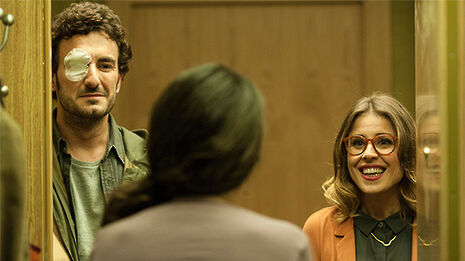Review: Awkwardly laughing at The One-Eyed King
Screened at the Cambridge Film Festival, Seth Jordan reviews this often amusing adaptation of the namesake play

Marc Creheut’s first foray into film directing is an adaptation of his own play. Set largely inside one apartment, the film is a dialogue-driven examination of two couples and their massively differing views on life. Lydia (Betsy Turnez) and David (Alain Hernandez) are the first of these pairs, David a bald and muscular riot cop, Lydia his kitchen-bound wife.
“The moment of recognition between the two is an amazingly funny and disturbing moment”
The two are seemingly content, even as David describes, with blackly comic indifference, how he shot someone’s eye out with a rubber bullet at a protest the other day. Enter Sandra (Ruth Llopis), an old acquaintance of Lydia, and Ignasi (Miki Esparbe), her gangly, sensitive, one-eyed husband, who have come for a reunion dinner.
Witty, fast paced dialogue sets up the jarring dynamic between the couples: the hosts believe the government’s suppressive, immigrant-bashing rhetoric (although “some of them are very good looking”) while the guests are virulently opposed to the status quo. This is not the only point of difference because eye-shooting riot cop David and eyeless protester Ignasi have met before. The moment of recognition between the two is an amazingly funny and disturbing moment, the audience held for a number of minutes in beautifully awkward suspense.
The fallout from the party shapes the remainder of the film. Lydia, realising that her husband enjoys half-blinding people, leaves him and a confused and upset David decides to call on Ignasi for help. In a satirical and thought-provoking way, Ignasi begins to teach David about the wrongs of the government and global corporations, and more deeply about how to “open up” beyond just crying at Marley and Me.
The film, like its source play, feels claustrophobic: the sets are dimly lit and almost all the characters do not want to be there. David’s attempts to understand left-wing ideology create plenty of laughs, particularly when he suggests the government might be doing “a lot of unjust things with vegetables” (“they could be speculating with broccoli”). It reaches a captivating climax as David begins to take active steps against the government. Ignasi’s peaceful, signature driven politics clashes with David’s more violent impulses and the finale is bizarre but brilliant.
Although a break in the fourth wall at the close feels a little odd and perhaps more suitable with a live audience present, it concludes as a funny and fascinating examination of the effects a violent government can have on its people
 Comment / Plastic pubs: the problem with Cambridge alehouses 5 January 2026
Comment / Plastic pubs: the problem with Cambridge alehouses 5 January 2026 News / Cambridge academics stand out in King’s 2026 Honours List2 January 2026
News / Cambridge academics stand out in King’s 2026 Honours List2 January 2026 News / Cambridge businesses concerned infrastructure delays will hurt growth5 January 2026
News / Cambridge businesses concerned infrastructure delays will hurt growth5 January 2026 News / AstraZeneca sues for £32 million over faulty construction at Cambridge Campus31 December 2025
News / AstraZeneca sues for £32 million over faulty construction at Cambridge Campus31 December 2025 Interviews / You don’t need to peak at Cambridge, says Robin Harding31 December 2025
Interviews / You don’t need to peak at Cambridge, says Robin Harding31 December 2025










